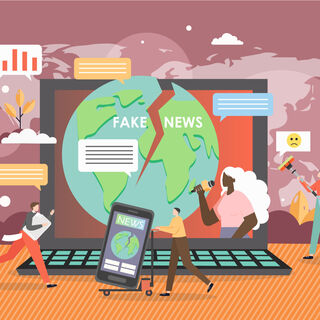Media
Social Media Promote "Information Incontinence"
Information requires self-constraint based on concern for truth and human needs.
Posted April 8, 2022 Reviewed by Tyler Woods
Key points
- The lack of self-restraint results in the spread of fake news.
- Misinformation can be reduced by methods that include caring before sharing, critical thinking, and political regulation.
- People can easily adopt tighter standards of communication.
The word “incontinent” today usually relates to urinary problems, but it has another, original meaning: lack of self-restraint. The way information spreads through society today suffers horribly from a lack of restraint, leading to the proliferation of misinformation and disinformation on topics that include COVID-19, climate change, conspiracy theories, and the Russian invasion of Ukraine.

Information incontinence was only a minor problem before the development of social media platforms in the 2000s. Previously, people sometimes showed a lack of constraint in spreading misinformation to others through gossip and rumors, but the spread was limited by the slowness of communicating by talking or writing. Technology has allowed instant communication with millions of people, through social media such as Facebook, Twitter, YouTube, TikTok, Instagram, WhatsApp, Reddit, and others.
Psychological research has found that people often pass on information without thinking much about whether it is true. Instead, information is shared just because it seems interesting to the sender and potentially interesting to the receivers. Unfortunately, interestingness is no guarantee of accuracy, and may even be contrary to it. To adapt the old journalistic example, “person bites dog” is more newsworthy than “dog bites person” even though the latter is more likely to be true.
Reputable journalists are nevertheless constrained to value accuracy over interestingness, but social media companies have felt no such limitations. In testimony to the U.S. Congress, former Facebook employee Frances Haugen revealed how the major concern of her workplace was not to rein in the massive amounts of misinformation known to spread on the platform, but rather to maximize user involvement that drives greater advertising revenue to enhance corporate profits. Facebook and other social media platforms have taken modest steps to reduce the spread of misinformation, but their bottom lines still often triumph over social responsibilities.
Science, medicine, law, and journalism have found better ways to foster professional continence by restraining the spread of information. Science journals employ peer review and editorial scrutiny to increase the chances that experimental and theoretical results have a greater than arbitrary chance of getting the world right. Such review is not foolproof, but it does ensure that articles cannot be published without some critical examination of their methods and results. Unfortunately, the internet has brought a proliferation of predatory journals that will publish anything for a fee, undermining the valuable constraint of peer review.
Gatekeeping is performed in medicine by government authorities and professional associations that decide on appropriate treatments based on the best scientific evidence, especially studies based on controlled clinical trials. Evidence-based medicine has been increasingly practiced since the 1990s, providing a valuable restraint on the adoption and use of ineffective drugs and procedures.
Legal proceedings also restrain information through rules of evidence that disallow the presentation of testimony that is irrelevant, inflammatory, unfair, coerced, or hearsay. Similarly, journalistic ethics restrict the publication of material that has not been fact-checked and corroborated by multiple witnesses. Thus, science, law, medicine, and journalism have found ways of fighting information incontinence by vetting information before it is spread. Social media should be pushed by both public agitation and government legislation to move closer to the communication standards of journalistic ethics. Peer reviewers, judges, and editors are like firefighters trying to control the flames of misinformation, but social media are like arsonists trying to fan them.
We cannot expect ordinary individuals to observe the professional levels of restraint found in journalism, science, law, and medicine, but people can easily adopt tighter standards of communication. The United Nations launched a campaign to reduce misinformation using the slogans “Pause” and “Take Care Before You Share.” Pausing interrupts an automatic response that encourages people to pass on messages and provides time to engage in critical thinking before sharing information that may be bogus. It sensibly asks people to avoid sharing information before they have had time to ask themselves these questions:
- WHO made it?
- WHAT is the source?
- WHERE did it come from?
- WHY are you sharing this?
- WHEN was it published?
I would expand the list to include:
- IS the information consistent with other things you know?
- WHAT is the evidence that the evidence is true?
- HOW could spreading this information hurt or help people?
The “care” in “take care before you share” should mean caring about the needs of people likely to be affected by the information and also caring about the truth, to make sure that what is being spread is accurate and honest.
Urinary incontinence can be treated by various methods that include bladder training, pelvic exercises, medications, surgery, and absorbent pads. Information incontinence is also treatable by various methods, including legal restraints on social media, greater teaching of critical thinking, and personal responsibility to take care before you share. All of these are needed to diminish the flood of misinformation that currently threatens health and politics.




